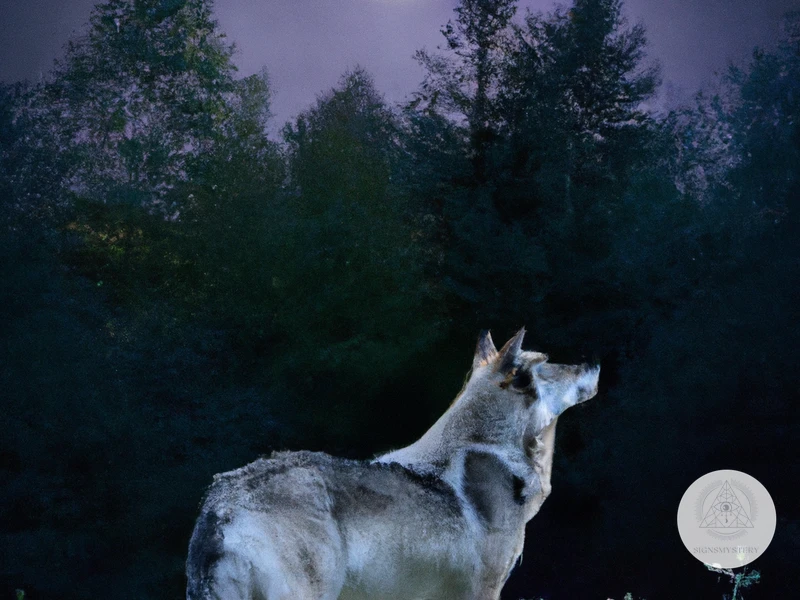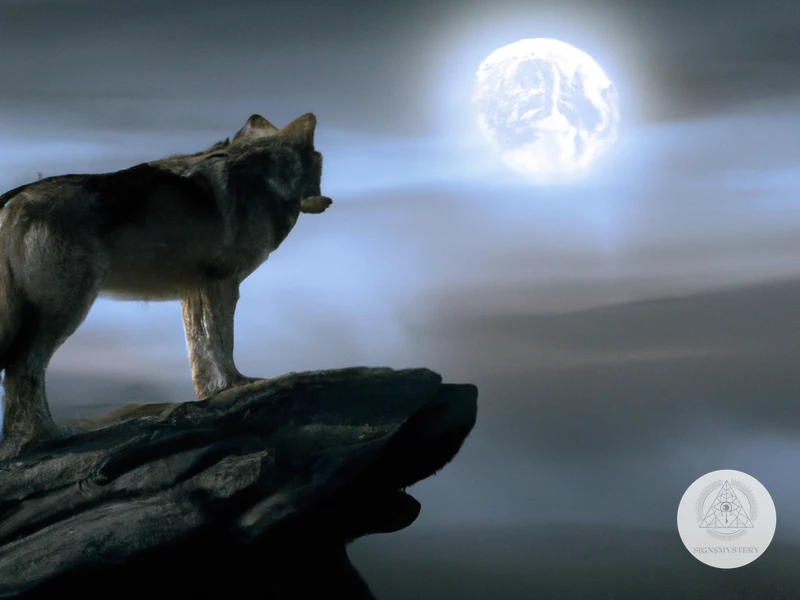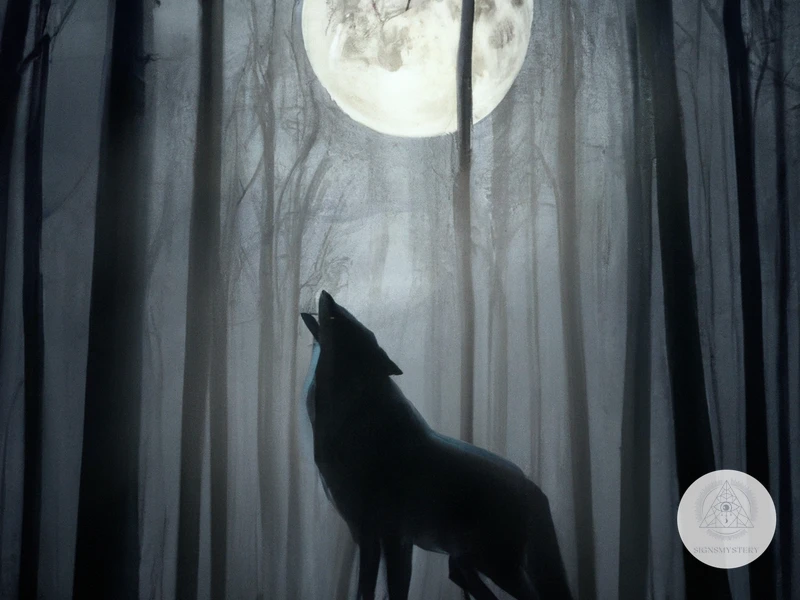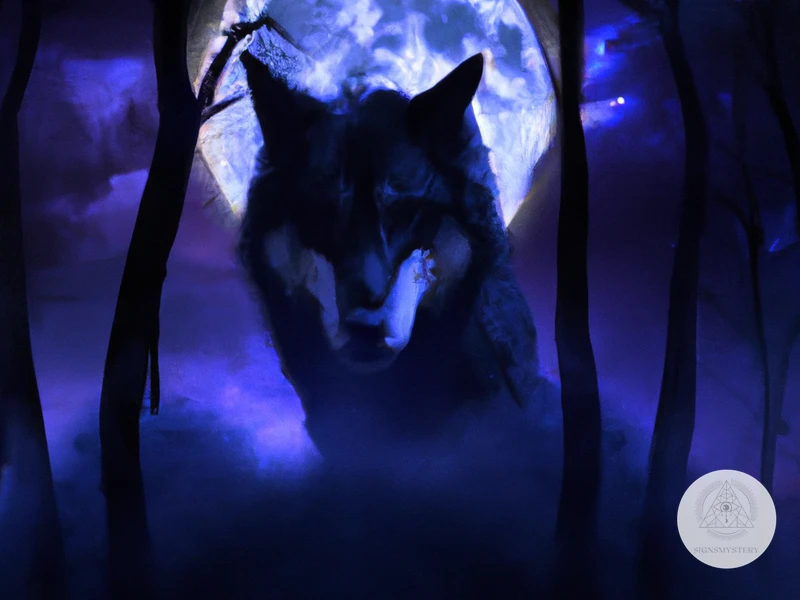Wolves have long captivated our imaginations and held symbolic meaning in various cultures throughout history. The allure of these majestic creatures lies not only in their physical prowess but also in the spiritual symbolism they embody. From their origins in ancient cultures to their significance in the Native American traditions, wolves have come to represent loyalty and intuition. In this article, we will delve into the profound symbolism of wolves, exploring their loyalty aspect and intuitive nature. By understanding these symbolic attributes, we can apply the lessons of wolves to our daily lives and find deeper meaning and connection within ourselves and our relationships.
Understanding Wolf Symbolism

Wolves hold deep symbolic significance across various cultures and traditions, representing the essential qualities of loyalty and intuition. Understanding the symbolism of wolves requires exploring their origins in ancient cultures, as well as their role in Native American traditions. These creatures have been revered for centuries for their loyalty to their pack, emphasizing the importance of unity, family, and trust. Additionally, wolves are known for their keen senses and instincts, which highlight their intuitive nature. By delving into the diverse symbolism associated with wolves, we can gain a deeper understanding of their spiritual significance and how we can apply their wisdom to our own lives. Exploring Indigenous and Modern Spirit Animals can further enhance our understanding of the broader context of wolf symbolism.
1. Origins of Wolf Symbolism
The origins of wolf symbolism can be traced back to ancient cultures and civilizations that recognized the unique qualities and characteristics of these majestic creatures. In Norse mythology, the wolf played a significant role, particularly with the mythical wolf Fenrir, who was foretold to bring about the end of the world during Ragnarok. The ancient Romans also revered the wolf, associating it with Mars, the god of war. In Celtic mythology, wolves were seen as powerful and majestic creatures, often associated with leaders and warriors. Additionally, in Japanese folklore, the wolf was considered a protective deity and a symbol of loyalty. The wolf’s symbolism continued to evolve throughout history, making its mark in various cultures around the world. Exploring the origins of wolf symbolism allows us to understand the ancient connections and interpretations of these creatures and their profound significance in spiritual practices. For a broader understanding of spiritual practices, healing nature sounds can provide a soothing and transformative experience.
2. Wolves in Ancient Cultures
Wolves have played a prominent role in the mythology and symbolism of ancient cultures around the world. In ancient Rome, for example, the mythical founders of the city, Romulus and Remus, were said to have been raised by a she-wolf. This symbolized the nurturing and protective qualities associated with wolves. In Norse mythology, the wolf Fenrir was a powerful and feared creature, seen as a symbol of chaos and destruction. The ancient Greeks also had a unique relationship with wolves, as they believed the god Apollo had the ability to transform into a wolf. This association linked wolves with power, divine presence, and protection. The symbolism of wolves in ancient cultures often represented a balance between the wild and the civilized, showcasing the primal nature that exists within humanity. Exploring the significance of wolves in ancient cultures provides us with a deeper understanding of their profound impact on human perception and mythology. To further explore the intuitive symbolism of spirit animal encounters, you can refer to the article “Exploring Intuitive Symbolism in Spirit Animal Encounters”.
3. Symbolism in Native American Traditions
Within Native American traditions, the symbolism of wolves holds a profound significance. Native American cultures have long revered the wolf as a spiritual guide and messenger. The wolf symbolizes loyalty, family, and unity within the tribe. One of the most prominent wolf symbols in Native American traditions is the wolf clan, which represents a group of individuals who share a common ancestry and are considered family. The wolf clan embodies the qualities of loyalty, cooperation, and protection. Native American tribes also believe that wolves possess a strong connection to the spiritual realm, acting as spiritual guides and messengers between humans and the divine. This belief is rooted in the observation of wolves’ behavior and their ability to navigate through various landscapes with agility and grace. Wolves are seen as guardians of sacred knowledge and wisdom, and their presence is often associated with spiritual growth and enlightenment. The Native American symbolism of wolves teaches us the importance of loyalty to our families and communities, as well as the value of embracing our spiritual connection and intuition. It reminds us to honor and respect the natural world, acknowledging the wisdom and guidance it offers.
Interpreting the Loyalty Aspect
The loyalty aspect of wolf symbolism encompasses several key elements that provide profound insights into our own lives. Firstly, the pack mentality of wolves emphasizes the importance of unity and cooperation within a group. Wolves rely on their pack for survival and protection, highlighting the value of family and collective strength. Secondly, loyalty is seen in the unwavering faithfulness and trust that wolves exhibit towards their pack and their chosen mates. This loyalty extends beyond mere companionship, symbolizing commitment and support in our relationships. Finally, the loyalty of wolves also serves as a reminder of the trust we should place in ourselves, staying true to our own values and convictions. Through the interpretation of the loyalty aspect, we can learn valuable lessons about the importance of unity, fidelity, and self-belief in our journey through life.
1. The Pack Mentality
The pack mentality is a fundamental aspect of wolf behavior and a key symbol in understanding their loyalty. Wolves are known for their strong social structure, living in close-knit packs led by an alpha male and female. Within the pack, each wolf has a specific role and contributes to the overall functioning of the group. This pack mentality emphasizes the importance of unity, cooperation, and looking out for one another. Wolves work together to hunt and protect their territory, showcasing their loyalty to the pack above all else. They have a remarkable ability to communicate and coordinate their actions, demonstrating their deep bonds and interconnectedness. This pack mentality serves as a reminder of the value of teamwork and the power of collective effort in achieving common goals. Whether it’s in our personal relationships, professional settings, or communities, embracing the pack mentality can strengthen our sense of loyalty and foster greater cooperation and unity.
Exploring the Intuitive Nature

When exploring the intuitive nature of wolves, it becomes clear that these magnificent creatures possess heightened senses and instincts. Their acute sense of smell, keen eyesight, and exceptional hearing allow them to navigate their environment with precision and accuracy. Wolves rely on their intuition to hunt, survive, and protect their pack. Their ability to tap into their instincts serves as a powerful reminder that we too have access to our own intuition. By paying attention to our inner voice and trusting our gut feelings, we can make decisions that align with our true selves and guide us on our spiritual journey. Wolves also embody spiritual guidance and wisdom, often seen as messengers from the spirit realm. Embracing the intuitive nature of wolves can help us connect with our own inner wisdom and discover the guidance that resides within us.
1. Heightened Senses and Instincts
Wolves are known for their heightened senses and instincts, which set them apart as skilled hunters and survivors in the wild. Their acute sense of hearing allows them to detect the faintest sounds, as their ears can rotate independently, picking up even the slightest rustle in the densest of forests. Additionally, their keen sense of smell is highly developed, with the ability to detect scents from great distances and track prey. The olfactory receptors in their noses are exceptionally sensitive, making them adept at locating food sources and identifying other members of their pack. Alongside their sharp senses, wolves possess a remarkable intuition that guides their actions. They have a sixth sense or premonition that helps them anticipate danger or detect changes in their environment. This instinct allows them to make quick decisions to protect themselves and their pack, ensuring their survival in challenging conditions. The combination of heightened senses and instinctual wisdom enables wolves to navigate their surroundings with remarkable precision and adaptability.
2. Spiritual Guidance and Wisdom
Spiritual guidance and wisdom are deeply connected to the symbolism of wolves. Wolves are often seen as spiritual guides, offering insight and wisdom to those who seek it. Through their intuition and heightened senses, they navigate the wilderness with grace and precision, inspiring us to tap into our own intuitive nature. The wolf’s ability to see beyond the surface and sense the unseen invites us to trust our instincts and delve into the deeper realms of spirituality. They remind us to listen to our inner voice and follow the guidance that comes from within. In many spiritual traditions, wolves are seen as messengers from the divine, offering profound wisdom and guidance to those who are receptive. By embracing the wolf’s spiritual symbolism, we can learn to trust in the interconnectedness of all things and find wisdom in the spiritual realm. The soothing sounds of healing nature sounds can aid in deepening our connection to the spiritual guidance and wisdom that wolves represent.
3. Embracing Intuition in Human Lives
Embracing intuition in human lives is a transformative practice that can lead to enhanced decision-making, personal growth, and spiritual development. In a world that often prioritizes logic and reason, tapping into our intuitive nature allows us to access a deeper level of wisdom and guidance. There are several ways we can actively embrace intuition in our day-to-day lives.
1. Cultivating Mindfulness: Practicing mindfulness helps us become more attuned to our inner selves and the present moment. By quieting the mind and creating space for introspection, we can better connect with our intuition and receive its subtle messages.
2. Trusting Gut Feelings: Intuition often manifests as a gut feeling or an instinctive knowing. It is important to trust these intuitive nudges and not dismiss them as mere coincidence or irrationality. By honoring our gut feelings, we can make more aligned choices and navigate life with greater clarity and authenticity.
3. Connecting with Nature: Nature serves as a powerful conduit for intuition. Spending time outdoors, whether in a forest, by the ocean, or in a garden, allows us to tap into the natural rhythms of the Earth and attune ourselves to the intuitive energy that permeates all living beings.
4. Cultivating Stillness: In the busyness of modern life, it can be challenging to hear the whispers of intuition. Taking time for solitude and silence on a regular basis can help quiet the external noise and create space for intuitive insights to emerge.
5. Honoring Inner Wisdom: Embracing intuition requires trusting our own inner wisdom. It is important to validate and honor our intuitive experiences, even if they may defy conventional logic or societal norms. By valuing our own unique perspective, we can harness the power of intuition to guide us on our spiritual journey.
Embracing intuition in our lives is an ongoing practice that requires self-awareness, openness, and a willingness to let go of control. By developing a deeper connection with our intuitive nature, we can access a profound source of wisdom and guidance, leading us towards a more authentic and fulfilling existence.
Applying Wolf Symbolism in Daily Life
The symbolic meaning of wolves, characterized by loyalty and intuition, can be integrated into our daily lives for personal growth and meaningful connections. In relationships, cultivating loyalty involves prioritizing trust, support, and commitment. By embracing the pack mentality, we can foster a sense of unity within our families and communities. Trusting our intuition, just as the wolf relies on its heightened senses and instincts, allows us to make informed decisions and navigate life’s complexities with wisdom and grace. Applying wolf symbolism means finding a delicate balance between loyalty and intuition, recognizing when to remain faithful and trusting, and when to tap into our inner instincts and guidance. By incorporating these powerful lessons into our everyday experiences, we can lead more purposeful and fulfilling lives.
1. Cultivating Loyalty in Relationships
Cultivating loyalty in relationships is an essential aspect that can lead to stronger and more meaningful connections. Much like the loyalty displayed by wolves in their pack, fostering loyalty in human relationships involves several key factors. Trust forms the foundation of loyalty, as it requires a deep sense of confidence and reliance on one another. Building trust involves open communication, being reliable, and keeping one’s commitments. Additionally, demonstrating understanding and empathy towards each other’s needs and emotions fosters a sense of loyalty. Mutual respect and appreciation for each other’s boundaries and individuality are also crucial. It is important to create a safe space where both parties feel comfortable expressing themselves and sharing their thoughts and feelings. By consistently showing loyalty and commitment, bonds are strengthened, and relationships thrive. Communication, trust, empathy, mutual respect, and commitment are all vital components in cultivating loyalty within relationships.
2. Trusting Your Intuition
Trusting your intuition is a key aspect of embracing the spiritual symbolism of the wolf. Wolves are
Subscribe to Our Newsletter
Sign up to receive the latest news and updates.
To trust your intuition, you must learn to tune in and become aware of the subtle signals and messages that it sends. This can be achieved through practices such as meditation, mindfulness, and quiet reflection. By creating space for stillness and silence in our lives, we open ourselves up to receiving intuitive guidance.
It is important to remember that trusting your intuition does not mean disregarding logic or critical thinking. Instead, it involves finding a balance between rationality and intuition. When faced with important decisions or challenging situations, take the time to quiet your mind and listen to the whispers of your inner knowing. Trust that the answers you seek are already within you.
Trusting your intuition also requires letting go of fear and self-doubt. Often, we may second-guess ourselves or seek external validation before making decisions. However, wolves teach us to have faith in our instincts and trust that we possess the wisdom needed to navigate our paths.
To practice trusting your intuition, start by making small choices based on your gut feelings. Pay attention to how these choices align with your overall well-being and the outcomes they bring. Over time, as you cultivate trust in your intuition, you will find yourself making more confident and authentic decisions that align with your true self.
Remember, trusting your intuition is a personal journey that requires patience and self-awareness. Embrace the wisdom of the wolf and allow its symbolism to guide you on the path of honoring and trusting your innate intuition.
3. Finding Balance with Loyalty and Intuition
Finding balance between loyalty and intuition is essential for navigating our lives with wisdom and harmony. Both loyalty and intuition hold significant value, but it is vital to strike a balance between the two. On one hand, loyalty cultivates strong relationships, promotes trust, and fosters a sense of commitment. It encourages us to stand by our loved ones and remain faithful even in challenging times. On the other hand, intuition serves as our inner compass, guiding us towards the path that aligns with our deepest desires and purpose. It allows us to tap into our instincts, make informed decisions, and connect with our higher selves. However, if we rely solely on loyalty without considering our intuition, we may find ourselves sacrificing our own well-being or compromising our authenticity. Conversely, relying solely on intuition without honoring loyalty may result in a lack of stability in our relationships and a disregard for the connections we have formed. Finding balance entails honoring our loyalty while also listening to our intuition. It involves discerning when to be loyal and when to trust our instincts. By finding this equilibrium, we can navigate the complexities of life with grace and cultivate harmonious relationships grounded in authenticity and purpose.
Conclusion

In conclusion, the spiritual symbolism of wolves as representations of loyalty and intuition holds a profound message for us. Through examining their origins in ancient cultures and their prominence in Native American traditions, we can comprehend the deep-rooted significance associated with these majestic creatures. The loyalty aspect of wolves teaches us the value of unity, family, and trust within our relationships. By cultivating loyalty in our interactions, we can foster stronger connections and create a sense of belonging. Additionally, the intuitive nature of wolves reminds us to trust our instincts and embrace our intuition. By honing our senses and seeking spiritual guidance, we can tap into a wellspring of wisdom and make more informed decisions. In our daily lives, we can apply these lessons by cultivating loyalty in our relationships and trusting our intuition. Finding a balance between loyalty and intuition allows us to navigate life’s challenges with grace and authenticity. By embracing the spiritual symbolism of wolves, we are encouraged to embrace our own inner strength, wisdom, and interconnectedness.
Frequently Asked Questions
1. What is the spiritual symbolism of wolves?
The spiritual symbolism of wolves revolves around two main aspects: loyalty and intuition. Wolves are seen as symbols of loyalty due to their strong sense of community, unity, and devotion to their pack. They also embody intuition through their heightened senses, instincts, and ability to navigate difficult situations.
2. What are the origins of wolf symbolism?
The origins of wolf symbolism can be traced back to ancient cultures, where these magnificent creatures were revered for their hunting prowess, social structure, and spiritual significance. Wolves were often associated with powerful deities, representing qualities such as protection, bravery, and guidance.
3. How are wolves depicted in ancient cultures?
In ancient cultures, wolves were depicted in various ways. For example, in Norse mythology, the fearsome wolf Fenrir was a prominent figure believed to bring about the end of the world. In Greek mythology, the wolf was associated with the god Apollo and symbolized both the destructive and transformative aspects of nature.
4. What is the significance of wolves in Native American traditions?
Wolves hold great significance in Native American traditions, often seen as powerful spirit animals representing loyalty, family, and protection. They are considered guardians and guides, embodying wisdom and the ability to navigate both physical and spiritual realms.
5. How does the pack mentality relate to loyalty symbolism in wolves?
The pack mentality of wolves emphasizes the importance of loyalty. Wolves work together cooperatively, demonstrating unity, support, and devotion to their pack members. This aspect of their behavior symbolizes the value of loyalty and the strength that comes from maintaining strong bonds with those around us.
6. What does the intuition aspect of wolf symbolism entail?
The intuition aspect of wolf symbolism speaks to their heightened senses and instincts. Wolves rely on their acute senses to navigate their environment, making them symbolic of trust in one’s intuition and the ability to perceive hidden truths. They embody the wisdom gained from instinctual knowledge.
7. How can wolf symbolism be applied in daily life?
Wolf symbolism can be applied in daily life by cultivating loyalty in relationships, placing value on trust and unity within families and communities. Additionally, embracing intuition and trusting our own instincts can lead to a deeper understanding of ourselves and our surroundings.
8. How can we cultivate loyalty in our relationships?
Cultivating loyalty in relationships involves being reliable, supportive, and maintaining open and honest communication. It means staying committed through both good and challenging times, fostering trust, and demonstrating love and dedication to one another.
9. What does it mean to trust your intuition?
Trusting your intuition means listening to your inner voice, your gut feelings, and your instincts. It involves honoring your own innate wisdom and guidance, even when rational explanations or external influences may suggest otherwise. Trusting your intuition allows you to make decisions aligned with your authentic self.
10. How can we find balance with loyalty and intuition?
Finding balance with loyalty and intuition involves recognizing when to rely on one or the other in different situations. It means honoring our commitments and maintaining loyalty while also trusting our intuition and making decisions that align with our inner knowing. Striking a balance between these two aspects can lead to harmonious and authentic living.
References
Frequently Asked Questions
What does it mean when a wolf appears in your dreams?
When a wolf appears in your dreams, it symbolizes your intuition and instincts guiding you through life challenges. It may also represent a call for you to trust your instincts and embrace your wild side.
How do wolves communicate with each other?
Wolves communicate with each other through various vocalizations such as howling, growling, and whimpering. They also use body language, such as facial expressions and postures, to convey their intentions and establish dominance within the pack.
Are wolves aggressive towards humans?
No, wolves are not typically aggressive towards humans. They are generally shy and prefer to avoid human interactions. However, if they feel threatened or their territory is invaded, they may display defensive behavior.
What is the significance of a lone wolf?
A lone wolf symbolizes independence and self-reliance. It signifies the need for solitude and introspection. While wolves are often associated with the pack, a lone wolf represents the individual’s ability to survive and thrive on their own.
Do wolves mate for life?
Yes, wolves are known for their monogamous mating behavior. Once a pair forms a bond, they usually stay together for life. This loyalty and faithfulness in their relationships is a prominent aspect of wolf symbolism.
Can wolves sense danger?
Wolves have highly developed senses, including exceptional hearing and an acute sense of smell, which allows them to sense danger from a distance. They are skilled at detecting potential threats and rely on their instincts to protect themselves and their pack.
How do wolves hunt for food?
Wolves are skilled hunters that use a combination of teamwork, strategy, and their keen senses to hunt for food. They often target large herbivores, such as deer or elk, and work together to surround and isolate their prey before making a coordinated attack.
Are all wolf packs led by an alpha wolf?
The concept of an alpha wolf as the leader of a pack has been debunked by researchers. Wolf packs are typically led by a breeding pair known as the alpha male and alpha female. However, the dynamics within a wolf pack are more complex and based on cooperation and collaboration rather than dominance.
Can wolves be domesticated?
Wolves are wild animals and have not been fully domesticated like dogs. However, certain wolf-dog hybrid breeds can be kept as pets, although they require specialized care and experienced owners. In general, wolves are best appreciated and respected in their natural habitat.
What can we learn from wolf symbolism?
Wolf symbolism teaches us the importance of loyalty, family, and trust. It encourages us to embrace our intuition and listen to our inner wisdom. By observing the behaviors and characteristics of wolves, we can gain insights into building strong relationships, finding our path in life, and living in harmony with our instincts.
References
- Wolf Symbolism & Spiritual Meanings Of Seeing Wolves
- Are You A Lone Wolf? Wolf Spiritual Meaning and Symbolism
- Wolf Symbolism & Meaning & the Wolf Spirit Animal – UniGuide










